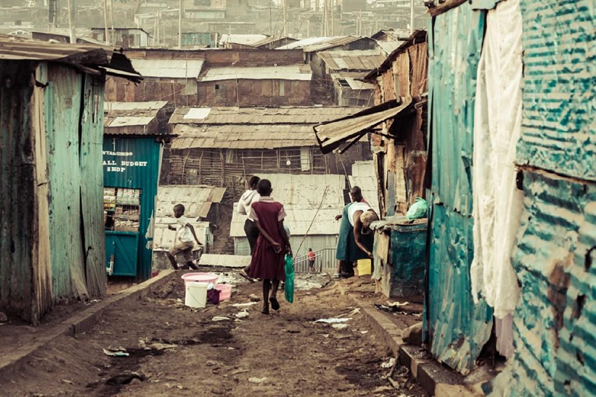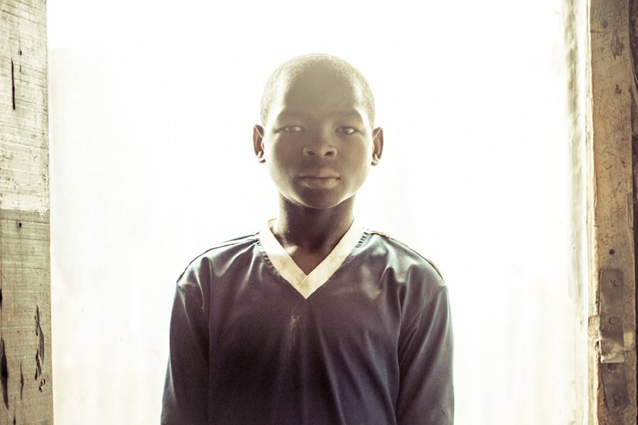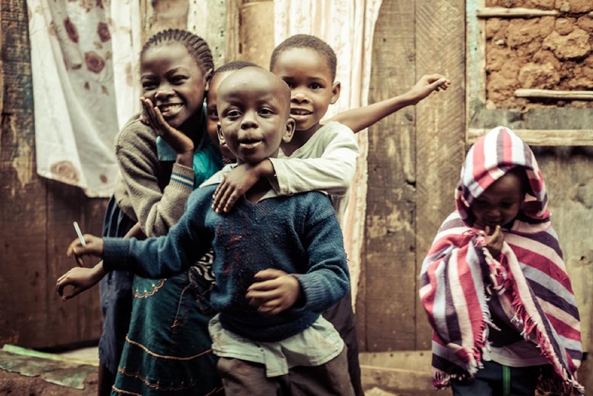A few years ago I read a blog post by Tien Tran, a French photographer who reported about his time in the Nairobi slums of Mathare. With his permission, I translated his posts from French and posted them online. I am reposting the translation here, as the original text unfortunately seems to be gone from his website.
All credits (pictures and original French text) go to him.
This is part 1 of a 2-part series. Part 2 is here.
Mathare (pronounced “Madaray”) is a slum East of Nairobi, capital of Kenya. Don’t bother looking it up on Yelp or Tripadvisor, the neighborhood doesn’t appear neither on the city’s maps nor on the various descriptions of the capital. Located between Juja Road and the Thika Super Highway, it is crossed by two watercourses. More like brownish water streams in which all waste water can pours down, really. Between 300,000 and 500,000 people are piled up in a few square kilometers. Wondering how the hell I ended up there? I am, too…
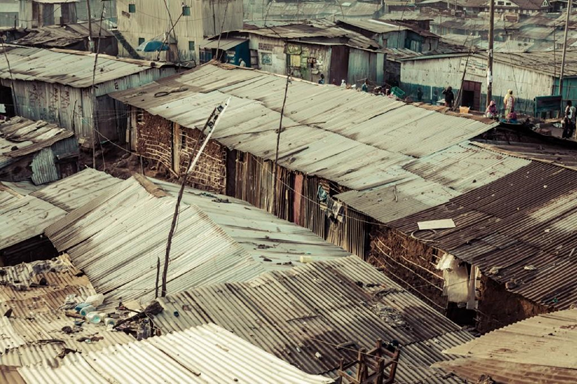 Welcome to Mathare: bird-eye view of the slum’s rooftops
Welcome to Mathare: bird-eye view of the slum’s rooftops
I arrived at Nairobi International Airport after a long flight. As I was walking out of the plane, the sun was already high up in the sky and the Kenyan heat and drought struck me. Eric, my couchsurfer, was waiting for me with three of his friends and had kindly offered to get me at the airport. I had no idea where he was living. We had barely exchanged a few emails and I was expecting to stay somewhere in the Nairobi city center.
We got in an old car, and we drove along Outerring Road, a potholed road where cars, bicycles, trucks, bikes and porters were all fighting for priority in traffic. In general, the Highway Code is an extremely abstract notion in Kenya, and road safety is a matter of intuition, luck and a good sense of anticipation.
We drove on roads along which spread out shacks and mountains of trash and waste, several meters high. Poverty was tangible. And yet, everyone was saying that Kenya was the economic pride of the region. I said to myself: “We are in the suburbs of Nairobi. We are going to be in the city center soon enough”. Instead of that, we started leaving the main roads and entering smaller streets and ended up in a very narrow back alley, surrounded by tall buildings. My jaw dropped to the floor. “God, please tell me that’s not where he lives”.
“Welcome to Mathare”, said Eric.
Imagine streets made from nothing but dirt, surrounded by damaged buildings, open to the winds that blow a mix of dust, dirt and plastic bags. Imagine canals running in the middle of the street, where the putrid water that streams is filled with shit giving out a smell so horrible it’s hard to handle. Imagine that smoky smell that flows from both from the shacks and the slowly burning mountains of trash. There are no garbage cans in the streets. People toss everything on the streets. Everything. Imagine the amount of trash generated by thousands of people living in those few square kilometers. Buckets of stagnant water are literally thrown out from windows. Dogs go through piles of trash looking for food they won’t find. They end up chewing dirt to try and extract any nutriments they can from it, then spit it back out. It’s dirty, it’s filthy, it smells. I don’t know it yet, but this is the best part of the neighborhood.
The car stopped and Eric and I got out. I was being careful and watching my steps to avoid the water streams and the trash. It was a waste of energy. We entered a dilapidated building, with cracked wall and faded out paint. We went up the stairs in a complete darkness, until we reached the fourth floor. There was the room where was living Eric, and in which there was nothing more than a couch and a bed. At the end of the corridor, the common toilets, a bare hole from which the pipes went to the ground floor then directly discharged in the street. Every morning, one of the residents (a woman) cleaned them. Without any source of water, the shit and the piss were accumulating all day long, making the smell almost unbearable in the early morning.
After leaving my backpack in his room, Eric walked me to his building’s rooftop. A light breeze was soothing the sun’s almost stinging heat. It took my eyes a few moments to get acquainted to the sudden light that replaced the darkness in the building. I realized what I hadn’t seen until now: the Mathare slums.
It took my eyes a few moments to get acquainted to the sudden light that replaced the darkness in the building. I realized what I hadn’t seen until now: the Mathare slums.
At my feet, slightly below us, a pile of sheet metal roofs, back alleys, mud and trash. Smoke flowing out from almost everywhere. It was a closed space, boxed in a small valley. On each side of this gruesome valley, buildings were overlooking it, hiding the poverty from the roadside. Two water courses were flowing in the valley’s bed, which, due to the place’s topology, were receiving all the wastewater.
“Please don’t go there. I don’t want to go there. I’m going to catch dysentery or get robbed”.
Without any notice, we got out and plunged into the heart of the slum.
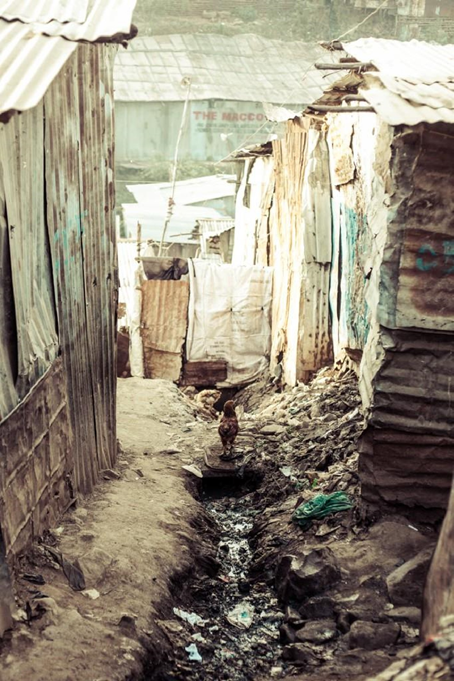 A hen looking for food in the evacuation channel
A hen looking for food in the evacuation channel
I walked, almost glued to Eric. I was terribly uncomfortable. The discovery was brutal. I wasn’t prepared for it. I didn’t want to go there. I wanted a warm shower, a bed, a sandy beach and a cocktail.
The poverty was indescribable. There were the barefoot kids playing in the middle of the trash piles covered by shit and plastic bits. There were the shacks displaying scrawny meat, exposed to the sun and on which flies were piling up. The only thing keeping them from completely covering the meat was the slow movement of a hand. There were the empty looks of the people who were sitting there, in the sun, waiting for the day to go by. There were the stray dogs mumbling as I was passing by. There were the featherless, scrawny hens pecking the trash looking for the slightest seed to eat. There were the slopes on which the slum’s water flowed to the rivers. There were caught the fish that a woman scaled and emptied on the crossroads of two back alleys. When a vehicle passed, the dust rose to end up on the fruits and vegetables sold on the floor. There were the 60-centimeter wide alleys in the middle of which a few women were doing their laundry. There were the neighborhoods where all the slum’s alcoholics and drug addicts gathered. They insulted me in Swahili, pointing at me in a shaky walk. And there were the kids. The only ones to smile. The only ones to laugh. The only ones to play.
The poverty was indescribable
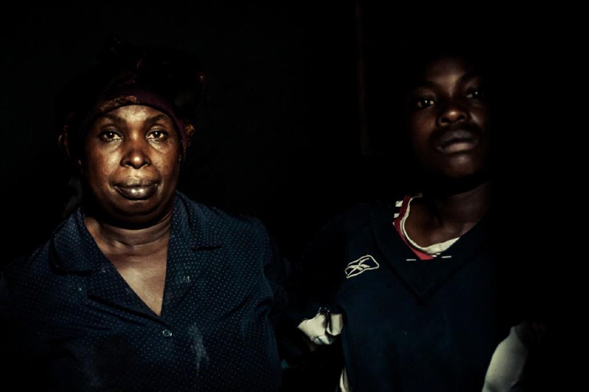 Teresia and Grace, residents of the Nairobi slum
Teresia and Grace, residents of the Nairobi slum
After walking for an hour, turning around in a maze that would have made any topographer go crazy, we ended up in one of those shanks made of sheet metal and mud. There, in the middle those two square meters, a woman was sitting. Teresia Mwehaki and her young daughter, Grace Njeri. On the floor, a mattress. Everything they owned was lined up against the wall: two stools, one stove, one pan and a pile of clothes. We were in the complete darkness, with no electricity. As her face was barely lit by the door left ajar, the mother started talking Swahili, with a slow and deep voice. Eric translated for me as she was speaking.
A typical story: Grace’s father disappeared overnight, the family, who then couldn’t pay rent anymore, has been evicted from the building. They lived with friends. Then, the only accommodation the mother could find was this room in the heart of the slum. Grace’s sister got pregnant when she was thirteen, and have birth to a little girl as she was just finished with elementary school. Her little brother was one year old. Then the rule became extremely simple: survive and make enough money to feed a four-person family.
As she was telling her story in a language I didn’t understand, her voice started shaking. Eric was translating for me in a monotonous tone. “I needed you to see and hear this”, he told me. He started telling me about a foundation he created with Heskey, an old friend. “We take care of the children to avoid them falling into drugs or prostitution. We try to make them see something other than Mathare”, he added. Teresia has to feed three generations. She works seven days a week trying to sell trifles or work whenever she can. She doesn’t have the time to take care of her kids. Eric’s foundation takes over when the kids are not in school and he asked me if I could do something to help them.
The rule became extremely simple: survive and make enough money to feed a four-person family.
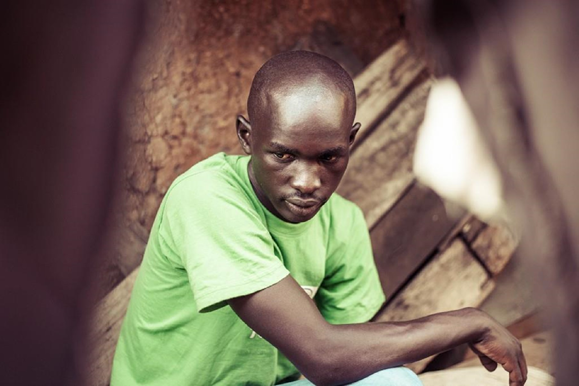 Eric, resident of Mathare and founder of the Mathare Foundation Youth Community
Eric, resident of Mathare and founder of the Mathare Foundation Youth Community
I felt like I had been trapped, that no one had warned me. The feelings I was experiencing at that moment were confusing, a mix of anger, sadness and culpability. But I was sensing an opportunity to try and understand a world that was beyond me, and so different from mine. Beyond the clichés, beyond the raw emotion, beyond this surge of sympathy that I
was feeling. Beyond the paternalism and the sentimentalism that the sudden discovery of this new reality brought to my mind and heart that day. I eventually told him that I could indeed do something, something that I knew how to do: tell the tale of what I had seen here.
I spent one week all inclusive in a Kenyan slum. This is my story.
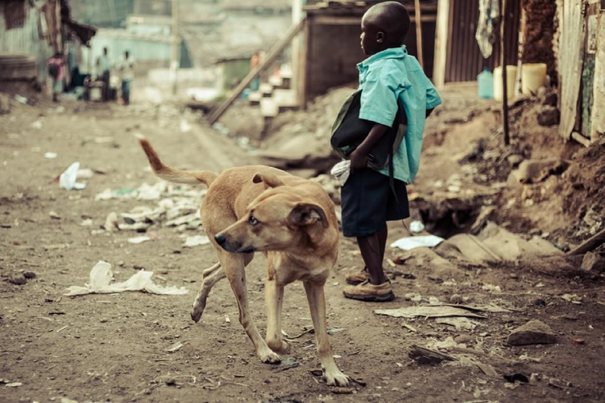 A dog explores the slum, looking for food
A dog explores the slum, looking for food
In the slums, life runs its course. Life always runs its course and that’s what struck me. To my occidental view, the conditions in which those residents are shocking. There is no running water. Anywhere. Pipes spring out of the ground, more or less randomly, from which flows a water that is sometimes clear, sometimes grayish. For all sanitary facilities, pieces of fabric provide a sham of intimacy. Holes are dug in the ground to do one’s business or take a shower. Some buildings have been built there, one of which is filled with showers. But since no one takes care of them, they ended up being even filthier than the streets. It’s almost impossible to get a precise head count, but according to Eric, at least 400,000 people are piling up in these few square kilometers.
When it’s raining (it has happened three times while I was there), there is no more electricity. Even if it’s raining droplets. That’s how I spent four hours in the dark, waiting for a heavy rain to stop. Mathare is a land of contrast. Running water is nothing more than a dream, but everyone owns a mobile phone and the network coverage is excellent. There are very few medical facilities, but a huge amount of bars where it’s possible to watch English football games, for a price. Families starve, and buy football shirts with the names of their favorite players. That’s the way it goes.
The people I met basically all share the same kind of story. Nickson lives with his aunt. His mother is an alcoholic, unable to take care of her child. His father died when he was still a baby, his two siblings are also dead. He is fan of football, as are most of Kenyans. Heskey also shares the same kind of ordinary fate: he lost his father when he was younger, and was beaten by his drunken stepfather when he got home. Girls get pregnant as soon as they finish elementary school. Young boys drop out of school to hang out with gangs. There’s drugs. There’s alcohol. There’s prostitution. There’s AIDS. There’s all kinds of illnesses.
Everyday life also shares this tragic tale. I saw a man lying in filth, as the thermometer was showing over thirty degrees. Four hours later, as I was passing by, I saw him again, same man, same position. « Is he dead ?» I asked Heskey. « I don’t know, maybe ». People passed by each side of his perhaps lifeless body, with a total indifference. In here, people experience death on a daily basis. Every single person I talked with had a story to tell about losing a member of his or her family. Most often than not, the loss is due to sickness. Or to plain violence, as was the case in the 2007 riots. Heskey showed me photos and videos depicting residents of the same slum using machetes to kill each other. Or beating one of them to death in a movement of madness that can only be birthed by a crowd. Whole houses have been burned down, sometimes with people still in them. Rapes were numerous. For ethic and political reasons. Today, the same people are now neigbors, and live together in a relative indifference. You have to hear the story of this man telling the slaughter of his brother, stabbed to death by a neighbor who now lives two blocks from him. No police, no arrests, no justice. Distress. Despair.
Thieves get beaten to death by the crowd, and then their bodies are left in the street. In the early morning, the corpses disappear, no one knows exactly how.
« Is he dead ?» I asked Heskey. « I don’t know, maybe »
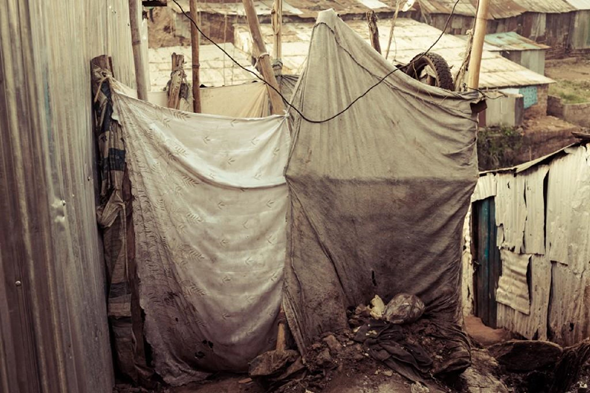 A communal shower, in the heart of the slum
A communal shower, in the heart of the slum
This relationship to death. This relationship to life. Eric, Heskey and many other Kenyans I have met during my stay told me about the fatalism that inhabit the people of Mathare. This distress, this defeatism, I will feel it during every single one of my discussions. If only for the lack of anger in front of me, the foreigner who from time time takes a Canon 5D from his bag to take a few pictures. It is almost strange to witness that indifference, when the sale of my camera alone would feed a family for months. During my many walks there, no one ever came to me to try and sell me something or ask me for money, as it would maybe be the case in other countries or other regions of Kenya, like the coast. Here, it’s as if the struggle was already over. Before it even started.
According to Sarah, a young 21-year-old volunteer girl from Germany who spent two months within the foundation, for the slum residents, today is the only thing that matters. Give them a thousand shillings, they will spend them on the same day. Give them a million shillings, they will do the same. When you face the Grim Reaper every day, she says, every day lived is a day won over death. There is no tomorrow. Nor is there a yesterday. There is only today, only this life, the only life most of them know about. Incidentally, the experience has been shocking for her. Even though she was a volunteer and knew more or less what was expecting her. The first days, the only thing she wanted was to go back home, she wasn’t ready for all that. But she found the strength to continue and stayed. Given enough time, you gradually get used to everything, and I ended up doing the same. After a while, the poverty disappears. The shocking view you get when you just get in fades, and everything becomes normal. Too normal. Abnormally normal. “Most of them don’t imagine any other outcomes other than their life here”, she told me. She speaks harshly of the adults. “They are not doing anything to make things better; they live day-to-day without worrying about tomorrow. When you can die at any given moment, by a wound that gets infected, by the sickness, you don’t worry about tomorrow. You don’t even know if you will have a tomorrow. For them, even AIDS doesn’t have any importance, because it’s a disease that doesn’t have immediate symptoms. To die in five years? Ten years? It’s far, it doesn’t matter”
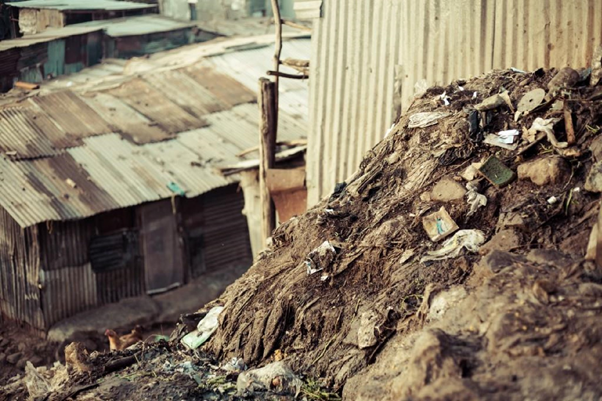 A pile of trash, among many others
A pile of trash, among many others
There is nothing better to hope for than Mathare. It’s life. It’s their life. Human beings get used to everything, or so they say. Nothing could be more true here. The kids, the younger, are incredibly full of life and smiles. But as soon as they get older than ten years old, the looks in their eyes change. It becomes more serious. They have experienced their first mourning. They have seen their first horrors.
When I saw this life, I asked Eric why people were coming here instead of staying in the countryside, where it was probably easier to feed one’s children. He told me the story of a family living in an isolated village in the Northwest of the country. One of the five kids caught malaria. The medical treatment against this disease is relatively common and costs two hundred shillings, which roughly translates to two euros. This family had the financial means to get it. It was located about two days from them. By the time they came back, the child was dead. At least in Nairobi, the medical facilities are not that far. Neither are the schools. People come here with the hope of finding a job and end up settling in. Then the next generations just follow.
When you can die at any given moment, by a wound that gets infected, by the sickness, you don’t worry about tomorrow.
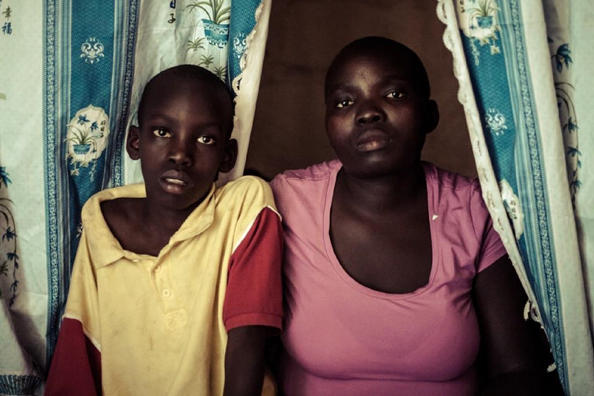 Elvis Omondi, 11 years old and her mother, Lucy Amino
Elvis Omondi, 11 years old and her mother, Lucy Amino
Most of the kids who are born and raised here don’t wander beyond the road that separates them from the neighboring district. Mathare is an autonomous city inside Nairobi. No cops, no need to go out. The law has no effect there. A black economy was born and everything they need is available. A closed microcosm that even other Kenyans fear. They hang out and usually have never seen anything other than poverty and filth. So they just sit there waiting, looking at the bystanders, drinking or doing drugs. Make any human being grow up ten, fifteen or twenty years in this place, and you can be assured that he will be certain that there is no other possible outcome. Kenya is about 40% of unemployment. Work is found by contacts, acquaintances, networks. You know someone who knows someone who wants to hire someone. If you only know the slum, the jobs you will find are those of the slum: temporary, informal ones. Almost never something stable and lucrative.
Religion is very important in Kenya. In Mathare, it is at the center of everything. If you take a walk on a Sunday morning, you will hear the various sermons and the gospel songs going out from the sheet metal shacks that act as places of worship. Every 50 meters, painted wooden boards point to the presence of a church in the vicinity. “God will provide” tell me many residents, again and again. «God will provide”. Remainder of the Christian evangelism of sub-Saharan Africa, the belief in God is very strong. ”God bless you”, they tell me, as I am listening to their stories and promising myself that I will tell them to the world. This belief that what happens, happens because of God’s will, and that if they pray enough, “God will provide”. From what I happened to see, God doesn’t provide that much to their needs…
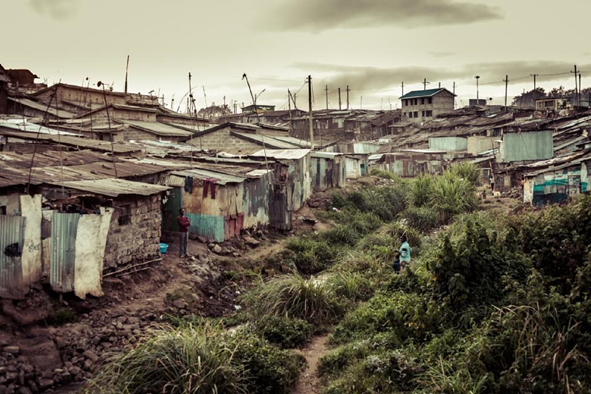 One of the two watercourses that cross Mathare
One of the two watercourses that cross Mathare
There is another issue. Some are better off if Mathare stays a slum and if its residents stay there, too. Originally, it was a government-owned property. People from the countryside, looking for jobs in the city, were setting up haphazardly, and were building temporary houses, waiting to find a job and a house in the city center. They ended up settling there, claiming property of the land. Then other people started buying the shacks out. Then renting them out. Then buying even more using the income generated by the rents. They ended up being real tycoons, the Mathare literal landlords, owning all the Mathare lands. They live in gigantic properties on Upper Hill, Nairobi’s upper class district. Thanks to the rent incomes from the slum. You have to understand that those people have no interest in having things change. And those people can pull strings. They have power. If they don’t want things to change, things won’t change.
I have heard the same words from a German woman, owner of a textile workshop and living in Kenya for 20 years. In Kibera, Nairobi’s best known slum, an NGO has started a project to build a working sanitation system. They managed to finance all the materials and pay the engineers. They had the concrete, the tools and the expertise. The only thing the project needed to succeed was workforce. They asked the Kibera residents, who were not working anyway, to help with the building of this sanitation system that would benefit to the whole community. ”They apparently didn’t manage to gather enough people”, she said, in a tone that conveyed a mix of hopelessness and despair.
In a slum, all these factors make it really hard to change things, confesses Eric. An outsider could come with the best intentions in the world, if he doesn’t know the slum, its microcosm, its network and its system, he would be helpless. You have to convince the influential people, you have to know the system’s machinery. Or else nothing will change.
“You have to understand that those people have no interest in having things change.”
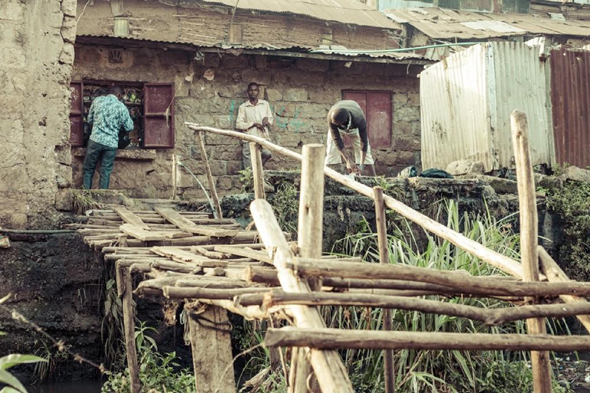 A wooden bridge crosses the river
A wooden bridge crosses the river
My week there left me shaken and hopeless. We all say to ourselves that it would be enough to wipe everything out and rebuild it from scratch for things to change. That it would be enough to inject millions of euros for the living conditions to get better. We want to shout out loud”We will save you”. But it doesn’t work like this. Things are complicated. I went out from there infected by this feeling of defeatism that still inhabits me while I am writing these lines. I found myself thinking: “there is nothing to do”.
So, should we give up the struggle and succumb to fatalism? No. Because there are reasons to hope and people fighting for the situation to evolve. Eric’s foundation, amongst others, is fighting to provide another future for the residents of Mathare. How do they do it? They take care of the foundations: the children.
I found myself thinking: “there is nothing to do”.
Before bringing this first part to a close, I would like to talk about the women from there. Kenya is a patriarchal country. The woman’s place is tough. But in the Mathare slums, they are the ones who fight, in numbers way larger than men. They take care of the house, educate the children and work. They know that without them, their family would not survive, the father often being absent or simply dead. They are the ones who tend to most of the stalls I see, they are the ones I see outside, doing the family’s laundry. They are the ones cooking in the evening, they are the ones taking their youngest children back from the Mathare school (made of sheet metal, it overlooks a pile of trash several meters high). From what I have seen, most of these slums’ residents owe their life to a mother, an aunt or a sister, dedicated to a single task: make everyone survive. There always is this sadness in their eyes, but in spite of everything, they continue fighting for their kids to have a better life.
End of part 1. To part 2.
Text & Photos: Tien Tran Translation: Youssef Boulkaid
